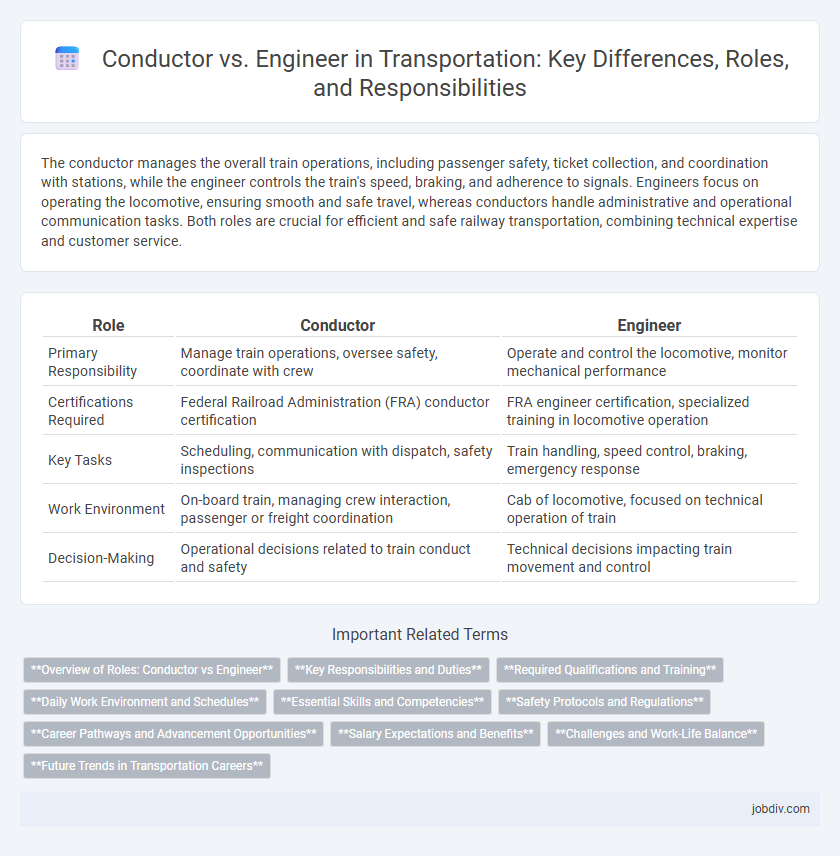The conductor manages the overall train operations, including passenger safety, ticket collection, and coordination with stations, while the engineer controls the train's speed, braking, and adherence to signals. Engineers focus on operating the locomotive, ensuring smooth and safe travel, whereas conductors handle administrative and operational communication tasks. Both roles are crucial for efficient and safe railway transportation, combining technical expertise and customer service.
Table of Comparison
| Role | Conductor | Engineer |
|---|---|---|
| Primary Responsibility | Manage train operations, oversee safety, coordinate with crew | Operate and control the locomotive, monitor mechanical performance |
| Certifications Required | Federal Railroad Administration (FRA) conductor certification | FRA engineer certification, specialized training in locomotive operation |
| Key Tasks | Scheduling, communication with dispatch, safety inspections | Train handling, speed control, braking, emergency response |
| Work Environment | On-board train, managing crew interaction, passenger or freight coordination | Cab of locomotive, focused on technical operation of train |
| Decision-Making | Operational decisions related to train conduct and safety | Technical decisions impacting train movement and control |
Overview of Roles: Conductor vs Engineer
The conductor oversees train operations, passenger safety, and communication between crew and stations, ensuring schedules are followed and cargo is secured. The engineer operates and controls the locomotive, managing speed, brake systems, and adherence to track signals for safe and efficient travel. Both roles require coordination to maintain operational safety and punctuality on railways.
Key Responsibilities and Duties
Conductors oversee train operations by managing crew coordination, passenger safety, and adherence to schedules, while also handling communication with dispatchers and passengers. Engineers are responsible for operating the locomotive, maintaining control over speed, braking, and mechanical systems to ensure safe and efficient train movement. Both roles require compliance with Federal Railroad Administration (FRA) regulations and collaboration to prevent accidents and ensure timely arrival.
Required Qualifications and Training
Conductors typically require a high school diploma and on-the-job training, including safety protocols and communication skills, while engineers must possess a commercial driver's license or railway certification and complete extensive technical training in operating locomotives. Engineer candidates undergo rigorous physical and psychological evaluations to meet federal regulations and must pass written and practical exams. Both roles mandate continuous education to comply with evolving transportation safety standards and technologies.
Daily Work Environment and Schedules
Conductors typically work on moving trains, coordinating with crew members to ensure passenger safety and efficient operations during shifts that often extend beyond standard hours, including nights and weekends. Engineers operate the train's controls, maintaining speed and handling mechanical functions within strict schedules that demand high concentration and adherence to safety protocols. Both roles require adaptability to changing conditions and irregular hours, with conductors emphasizing communication tasks and engineers focusing on technical operation.
Essential Skills and Competencies
Conductors require strong communication skills, attention to detail, and the ability to manage schedules and ensure passenger safety throughout the journey. Engineers must possess deep technical knowledge of locomotive systems, excellent problem-solving abilities, and proficiency in operating complex machinery under varying conditions. Both roles demand situational awareness, teamwork, and adherence to strict safety protocols to maintain efficient and secure transportation services.
Safety Protocols and Regulations
Conductors and engineers both adhere to strict safety protocols and regulations mandated by the Federal Railroad Administration (FRA) to ensure safe operations. Engineers are responsible for operating the train controls, maintaining speed limits, and monitoring mechanical systems, while conductors manage crew coordination, signaling, and communication with dispatch. Both roles require comprehensive training on emergency procedures, hazard identification, and compliance with OSHA standards to prevent accidents and ensure passenger and cargo safety.
Career Pathways and Advancement Opportunities
Career pathways for conductors typically begin with entry-level positions in rail operations, advancing to roles involving crew management and scheduling coordination, with opportunities to transition into supervisory or safety inspector roles. Engineers often start as assistant engineers or trainees, progressing through certifications to become lead locomotive operators, with potential career advancement into train operations management or technical specialist positions. Both careers require continuous training and certification, but engineers usually have higher earning potential and responsibilities linked to train performance and safety.
Salary Expectations and Benefits
Conductors typically earn an average salary of $60,000 to $75,000 annually, while engineers can expect higher compensation ranging from $80,000 to over $100,000 due to specialized technical skills. Both positions often include benefits such as health insurance, retirement plans, and paid time off, with engineers sometimes receiving additional bonuses tied to operational performance. Salary variations depend on factors like experience, employer type, and geographic location within the transportation industry.
Challenges and Work-Life Balance
Conductors face challenges in coordinating train operations and managing passenger safety while adhering to strict schedules, often resulting in irregular hours and extended periods away from home. Engineers bear the responsibility of operating locomotives safely, requiring intense concentration and dealing with long shifts that disrupt personal routines. Both roles struggle with maintaining work-life balance due to unpredictable hours and the physical and mental demands of rail transportation.
Future Trends in Transportation Careers
Advancements in automation and artificial intelligence are reshaping the roles of conductors and engineers in transportation, with engineers increasingly focusing on managing automated systems and optimizing smart rail networks. Conductors are expected to integrate more customer service and safety oversight functions as technology handles routine operational tasks. Emerging trends emphasize continuous upskilling in digital technologies and cybersecurity to adapt to evolving transportation infrastructures.
Conductor vs Engineer Infographic

 jobdiv.com
jobdiv.com